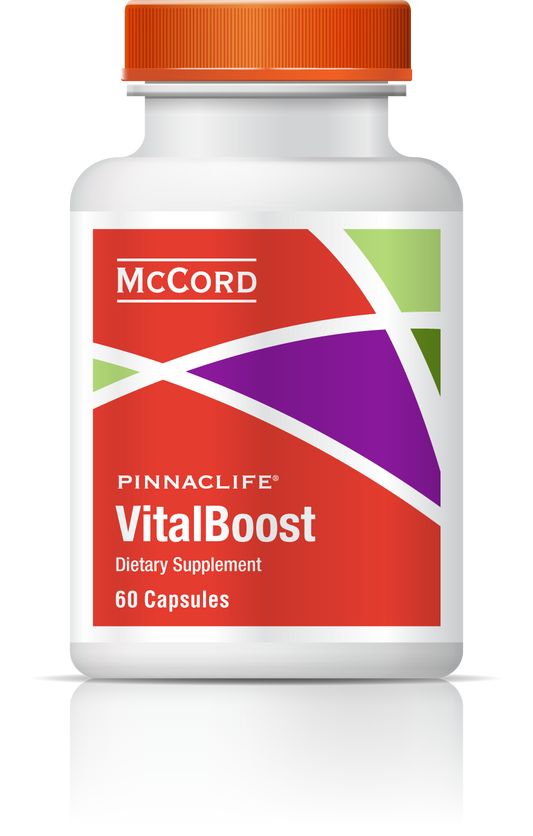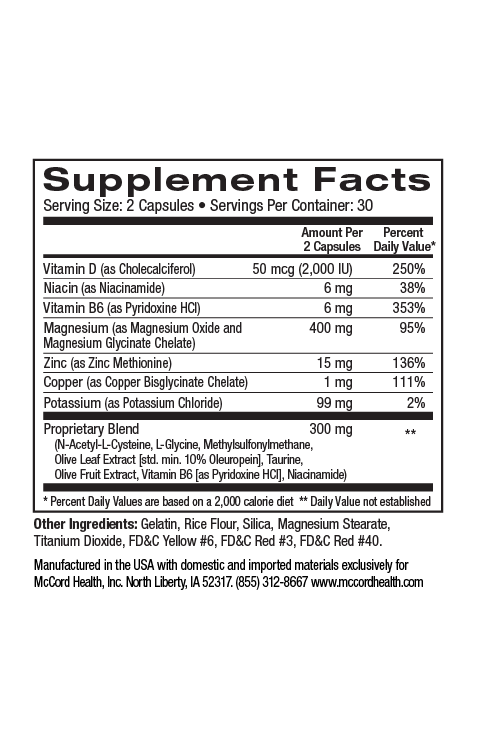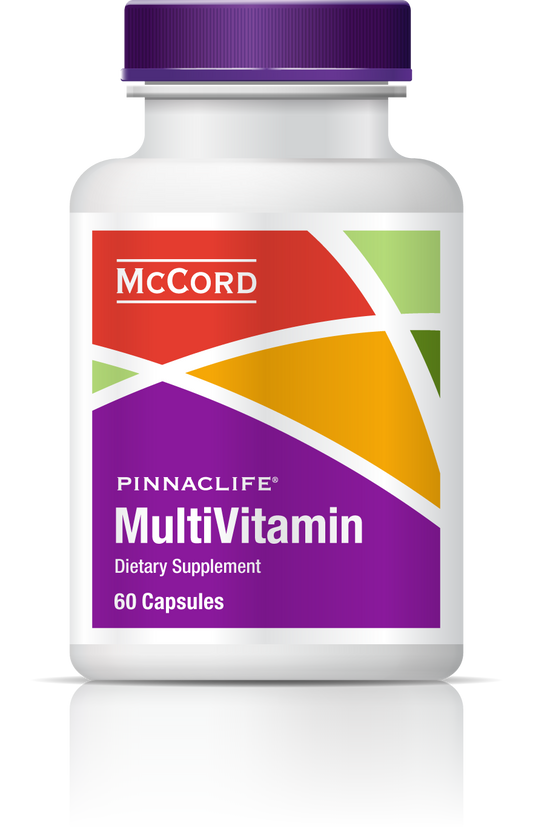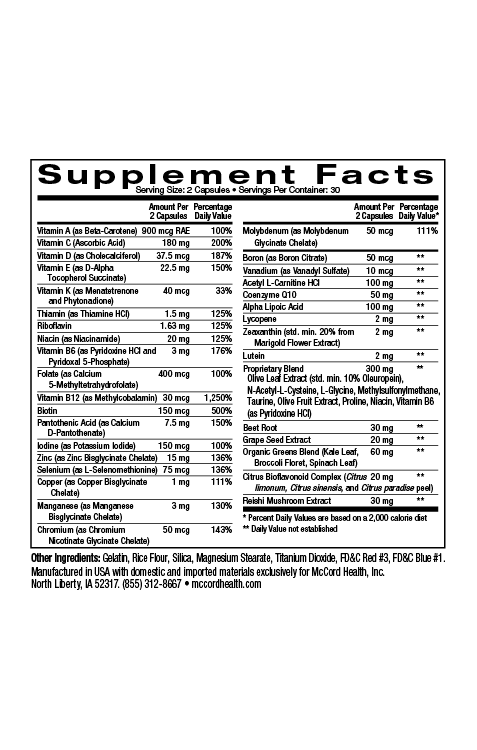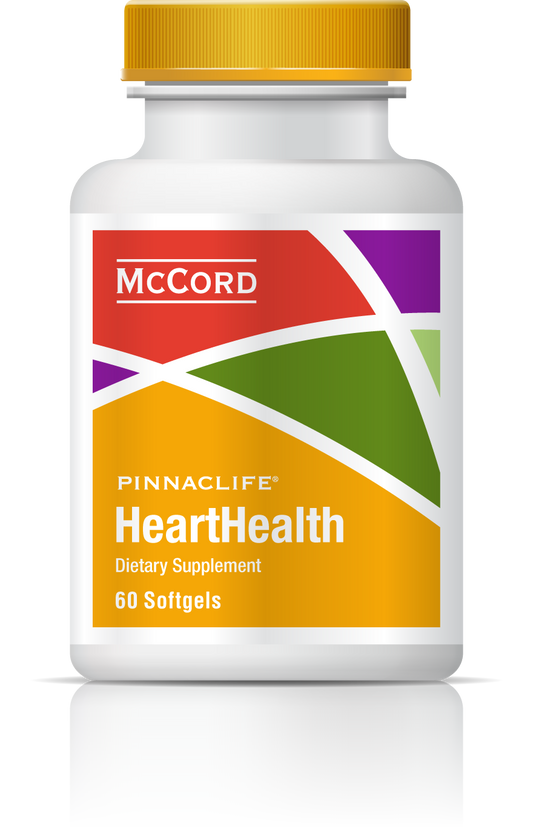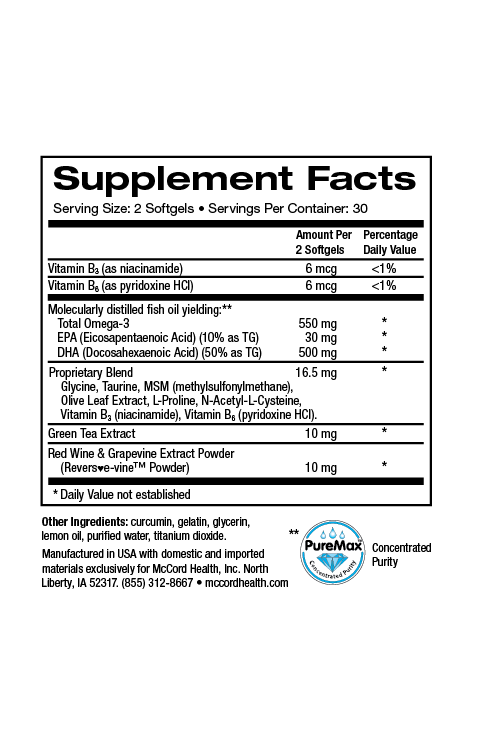Nutritional support for immune health can be an important step to keep you healthy during cold and flu season. In addition to the flu vaccine, you can incorporate antioxidants and nutrients like Vitamin C, Vitamin D, Zinc, and prebiotic fiber that all play an important role in supporting and boosting your immune system and overall immune health.
- The flu shot only protects from a couple specific strains of flu virus
- There are many other viruses and bacteria that cause illness during cold and flu season
- Certain nutrients that can boost your immune system and offer an extra layer of protection against illness
- Don't just rely on the flu shot - also incorporate immune-boosting lifestyles and nutrients
Tell me More!
Every year as cold and flu season approaches there is a flood of advertisements urging you and your family to get your annual influenza vaccination sooner than later - but you can get a flu shot and still got sick!
What Steps Can You Take to Avoid Getting Sick?
There is a lot you can do in addition to getting vaccinated to help boost your immune system and improve your chances of staying healthy all year long. Some of the best and most effective things involve simple lifestyle modifications.2–4 I'm sure you've heard them before:
- stay physically activity
- eat plenty of fresh vegetables and fruits
- drink enough water (at least 64 oz. per day)
- get adequate sleep
- follow good hand washing practices
Lifestyle changes are certainly important for improving your immune health, but you can also give your immune system an added boost by incorporating specific nutrients into your routine.
Nutritional Support for Immune Health
Antioxidant Support
Proprietary Blend ImmuneHealth provides nutrients that help your body rid itself of the toxins that burden and overwhelm your immune system including natural antioxidants, B vitamins, and select amino acids.
Proprietary Blend, developed by McCord Research, has been shown to increase genetic expression of protective antioxidants and proteins within the cell that can remedy oxidative damage and increase the lifespan of cells. This is important to reduce the effects of cellular waste products that can burden the immune system and contribute to illness.5–8
Liver and Detox Support
Low levels of an important detoxifying compound called glutathione have been associated with viral infection and impaired immune function. Your body cannot absorb glutathione from the diet, but nutrients that increase your body's production of glutathione, like N-acetyl-l-cysteine, have been shown to help support a healthy immune system.13
Proprietary Blend ImmuneHealth contains N-acetyl-l-cysteine plus sulforaphane (from broccoli) that help both support the immune system and healthy liver metabolism by restoring levels of important detoxifying enzymes and antioxidants including glutathione.9–12
Zinc and Vitamin C for Immune Health
During cold and flu season, you frequently hear people recommending using nutrients like Vitamin C and Zinc to boost your immune system. While they do play an important role in immune health, it is important to remember that Vitamin C and Zinc both rely on a full spectrum of vitamins, minerals, and antioxidants working in concert with each other.
You are better off taking zinc and Vitamin C as part of a balanced multivitamin, in combination with a well-balanced diet, and avoiding the supplements that only contain one or a couple of those ingredients in high doses. Your body needs all of those nutrients working together!
Proprietary Blend Total Health MultiVitamin contains a full spectrum of vitamins, minerals, and antioxidants including zinc and vitamin C, properly balanced to promote optimal health.14,15
Vitamin D for Immune Health
Vitamin D is a hormone that is produced naturally in your skin by sunlight. A large percentage of Americans are becoming deficient in Vitamin D because they are spending more time indoors and also protecting their skin from sunlight using clothing and sunscreens.
People also experience lower Vitamin D levels in winter months when there is less direct sunlight available.18 Vitamin D is a potent stimulator of immune cells and required for proper functioning of the immune system.19–21
Vitamin D Deficiency is thought to contribute to the increased rates of illness, heart attacks, seasonal depression, and weight gain that we see in the winter months.18,22,23
Maintaining adequate levels of Vitamin D is considered by many healthcare professionals to be just as important, if not more important, than getting an annual flu shot.24,25
Dietary Fiber to Support Immune-Boosting Probiotic Bacteria
The bacteria living in your intestines play an important role in protecting your from infections by supporting and boosting your immune system. Getting plenty of prebiotic fiber in your diet is a great way to support those healthy bacteria.
If you have been prescribed an antibiotic to treat an illness, there is a good chance it impacted the bacteria in your gut, so it is especially important to restore that balance as soon as possible.
Get Adequate Sleep for Better Immune Function
Getting enough sleep is important to stay healthy and keep your immune system primed and ready. Incorporating nutrients like magnesium, curcumin, and melatonin can naturally support restful sleep and a healthy immune system.16,17
Should you Get a Flu Shot?
It is important for many people to get annual flu vaccinations to reduce the risk of infection, serious complications, and even death.1 Research has routinely confirmed dramatic decreases in illness, sick days, and duration and severity of infection following vaccination.1 Keep in mind, the flu vaccine is not just for keeping you healthy, but also the people around you who are unable to get vaccinated.
CDC Recommendations for Influenza Vaccination
The CDC recommends everybody over 6 months of age receive the flu vaccine, but especially those at high risk for flu-related complications or those routinely in contact with people at high risk. People in these groups should also be asking what else they can do to boost their immune system. The high-risk groups are identified as:
- Children younger than 5, but especially younger than 2
- Adults over age 65
- Pregnant women
- Residents of nursing homes or long-term care facilities
- Native Americans and Alaskan Natives
The CDC also recommends vaccinations for people with the following health conditions due to increased risk of flu-related complications:
- Asthma
- Neurological and neurodevelopmental conditions
- Chronic lung diseases
- Heart disease
- Blood disorders
- Endocrine disorders
- Kidney disorders
- Liver disorders
- Metabolic disorders
- Weakened immune systems
- People under 19 on long-term aspirin therapy
- Obese people with BMI over 40
Influenza isn't the only winter-time illness
Remember, the flu vaccine is not guaranteed to keep you from getting sick and actually only protects you from 3-4 strains of influenza that are selected by experts a year in advance based on best guesses of the most likely strains for the year. A flu vaccine will not protect you from many other wintertime illnesses including the common cold (rhinovirus) or "stomach flu" (norovirus).
This is why it is so important to be proactive and incorporate other strategies and remedies in addition to the flu shot to stay healthy all year round!
For more information about the flu vaccine, contact your trusted healthcare provider or visit the Center for Disease Control webpage.
References
- American Academy of Pediatrics Committee on Infectious Diseases. Recommendations for Prevention and Control of Influenza in Children, 2014-2015. Pediatrics. 2014;134(5):e1503-19.
- Walsh NP, Gleeson M, Pyne DB, et al. Position Statement. Part two: Maintaining immune health. Exerc Immunol Rev. 2011;17:64-103.
- Milner JJ, Beck M a. The impact of obesity on the immune response to infection. Proc Nutr Soc. 2012;71(2):298-306.
- Moyad MA. Conventional and alternative medical advice for cold and flu prevention: what should be recommended and what should be avoided? Urol Nurs. 2009;29(6):455-458.
- Ritz SA, Wan J, Diaz-Sanchez D. Sulforaphane-stimulated phase II enzyme induction inhibits cytokine production by airway epithelial cells stimulated with diesel extract. Am J Physiol Lung Cell Mol Physiol. 2007;292(1):L33-9.
- Kim H-J, Barajas B, Wang M, Nei AE. Nrf2 activation by sulforaphane restores the age-related decline of Th1 immunity: Role of dendritic cells. J Allergy Clin Immunol. 2008;121(5):1255-1261.
- Shapiro TA, Fahey JW, Dinkova-Kostova AT, et al. Safety, tolerance, and metabolism of broccoli sprout glucosinolates and isothiocyanates: a clinical phase I study. Nutr Cancer. 2006;55(1):53-62.
- Kerksick C, Willoughby D. The antioxidant role of glutathione and N-acetyl-cysteine supplements and exercise-induced oxidative stress. J Int Soc Sports Nutr. 2005;2(2):38-44.
- Fraternale a, Paoletti MF, Casabianca a, et al. Antiviral and immunomodulatory properties of new pro-glutathione (GSH) molecules. Curr Med Chem. 2006;13(15):1749-1755.
- Sarsour EH, Kumar MG, Kalen AL, Goswami M, Buettner GR, Goswami PC. MnSOD activity regulates hydroxytyrosol-induced extension of chronological lifespan. Age (Omaha). 2011;34:95-109.
- Fabiani R, Rosignoli P, Bartolomeo A De, et al. Oxidative DNA Damage Is Prevented by Extracts of Olive Oil , Hydroxytyrosol , and Other Olive Phenolic Compounds in Human Blood. J Nutr. 2008;Aug; 138(8):1411-1416.
- Yamada K, Ogawa H, Hara A, et al. Mechanism of the antiviral effect of hydroxytyrosol on influenza virus appears to involve morphological change of the virus. Antiviral Res. 2009;83(1):35-44.
- Wahle KWJ, Caruso D, Ochoa JJ, Quiles JL. Olive oil and modulation of cell signaling in disease prevention. Lipids. 2004;39(12):1223-1231.
- Stephen AI, Avenell a. A systematic review of multivitamin and multimineral supplementation for infection. J Hum Nutr Diet. 2006;19(3):179-190.
- McKay DL, Perrone G, Rasmussen H, et al. The effects of a multivitamin/mineral supplement on micronutrient status, antioxidant capacity and cytokine production in healthy older adults consuming a fortified diet. J Am Coll Nutr. 2000;19(5):613-621.
- Moghadamtousi SZ, Kadir HA, Hassandarvish P, Tajik H, Abubakar S, Zandi K. A review on antibacterial, antiviral, and antifungal activity of curcumin. Biomed Res Int. 2014;2014(Article ID 186864):1-12.
- Boga JA, Coto-montes A, Rosales-corral SA, Tan D, Reiter RJ. Beneficial actions of melatonin in the management of viral infections: a new use for this “molecular handyman”? Rev Med Virol. 2012;22:323-338.
- Rosecrans R, Dohnal JC. Seasonal vitamin D changes and the impact on health risk assessment. Clin Biochem. 2014;47(7-8):670-672.
- Griffin M, Xing N, Kumar R. Vitamin D and its analogs as regulators of immune activation and antigen presentation. Annu Rev Nutr. 2003;23:117-145.
- Cantorna MT. Vitamin D and its role in immunology: multiple sclerosis, and inflammatory bowel disease. Prog Biophys Mol Biol. 2006;92(1):60-64.
- Prietl B, Treiber G, Pieber TR, Amrein K. Vitamin D and immune function. Nutrients. 2013;5(7):2502-2521.
- Berry DJ, Hesketh K, Power C, Hyppönen E. Vitamin D status has a linear association with seasonal infections and lung function in British adults. Br J Nutr. 2011;106(9):1433-1440.
- Cannell JJ, Vieth R, Umhau JC, et al. Epidemic influenza and vitamin D. Epidemiol Infect. 2006;134(6):1129-1140.
- Urashima M, Segawa T, Okazaki M, Kurihara M, Wada Y, Ida H. Randomized trial of vitamin D supplementation to prevent seasonal influenza A in schoolchildren. Am J Clin Nutr. 2010;91(5):1255-1260.
- Lang PO, Samaras D. Aging adults and seasonal influenza: does the vitamin d status (h)arm the body? J Aging Res. 2012;2012(Article ID 806198):1-8.
Disclaimer: These statements have not been reviewed by the FDA. These products are dietary supplements and are not intended to treat, cure, or prevent any disease. The decision to use these products should be discussed with a trusted healthcare provider. The authors and the publisher of this work have made every effort to use sources believed to be reliable to provide information that is accurate and compatible with the standards generally accepted at the time of publication. The authors and the publisher shall not be liable for any special, consequential, or exemplary damages resulting, in whole or in part, from the readers’ use of, or reliance on, the information contained in this article. The publisher has no responsibility for the persistence or accuracy of URLs for external or third party Internet websites referred to in this publication and does not guarantee that any content on such websites is, or will remain, accurate or appropriate.

